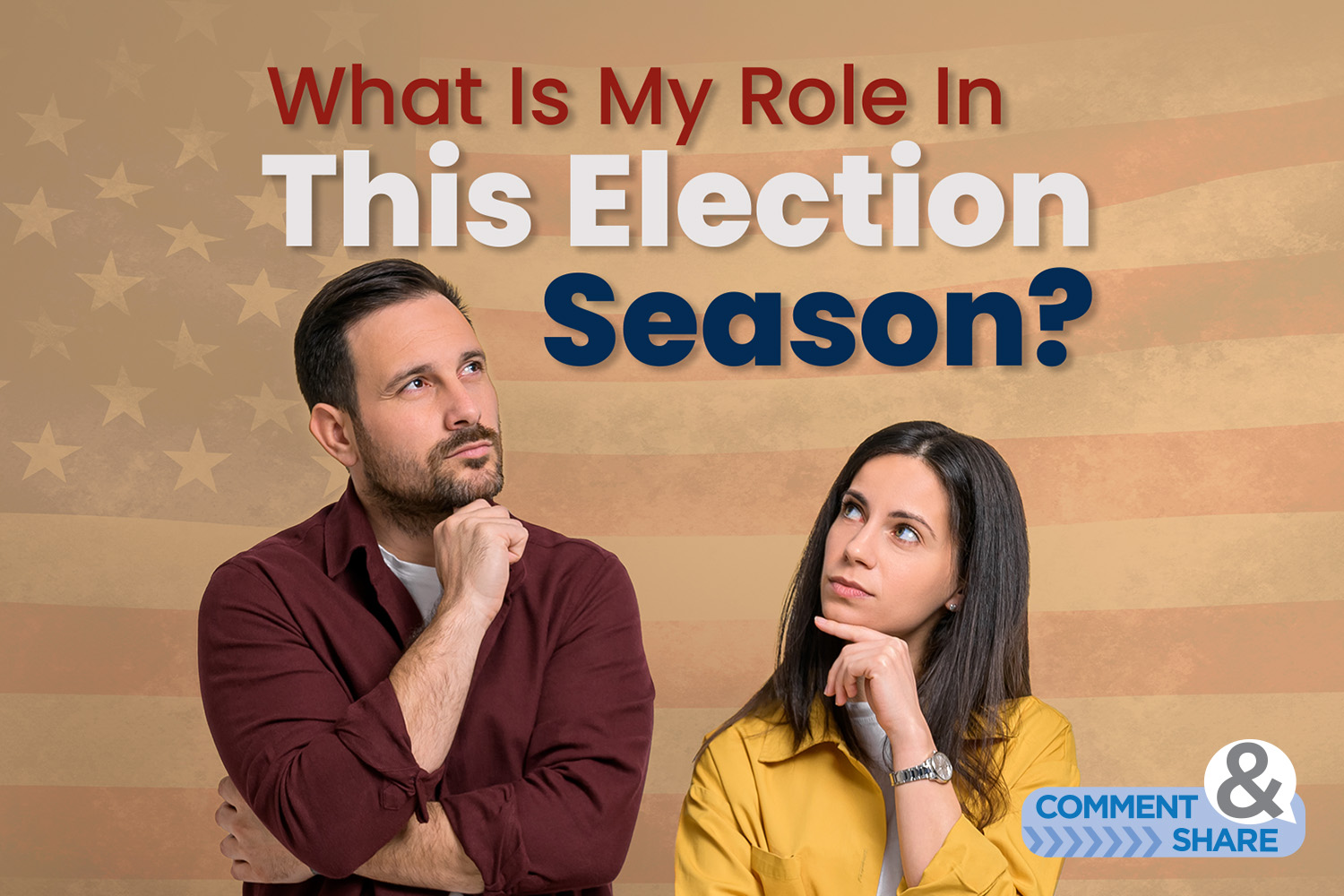The United States of America was birthed from a foundation on the Word of God. Our Founding Fathers understood the supremacy of Scripture and the standards it set forth in critical matters of life—the value and protection of human life; the stewardship of our God-given resources; the key building blocks of government, marriage and family; as well as a covenant relationship with the people of Israel. They understood that prioritizing these core biblical issues would help secure a sound, civilized and successful nation.
But what the creators of our Constitution and forgers of our freedom also understood was doing their duty—and for them, that meant establishing a new, never-seen-before form of government.
So, what about us today? What’s our duty? How do we keep alive what first-generation Americans created nearly 250 years ago? We find ourselves asking, What Is My Role In This Election Season?
Finding the Who To Do the What
By the design of our Founding Fathers, all political roads leading up to the birth of America pointed back to the Creator and heavenly Father, and to His Word and standards of living. And what America’s fathers could all agree on was two major takeaways from Scripture.
First, they saw early on that God advocated a representative form of government, as explained here by Moses’ father-in-law, Jethro, at a time when Moses was being overrun with the sole responsibility of civil leadership:
“Let me give you a word of advice…. You should continue to be the people’s representative before God, bringing their disputes to him…. But select from all the people some capable, honest men who fear God and hate bribes. Appoint them as leaders over groups of one thousand, one hundred, fifty, and ten” (Exodus 18:19, 21).
Long before Israel ever had kings for national leaders, a republic form of government was set up by choosing leaders to represent the people at multiple levels. A similar version of this kind of government was later used by the Church (Acts 6:1-6).
America’s Founding Fathers drew from this precedence established by God and added to it another vital piece necessary for what would become our nation’s unique democratic republic. Again, they would draw from God’s Word, and the Originator of government Himself. Because, when it came time for God to form His own nation and choose its leaders, His fundamental standards were clear and simple:
“But the LORD said to Samuel, ‘Don’t judge by his appearance or height, for I have rejected him. The LORD doesn’t see things the way you see them. People judge by outward appearance, but the LORD looks at the heart’” (1 Samuel 16:7).
In choosing a leader for His people, Israel, God had to correct His official spokesperson, the prophet Samuel. As the nation’s top spiritual leader, it was Samuel’s job to anoint and officially declare who this king (handpicked by God) would be. With the list of candidates narrowed down to eight, Samuel was willing to go with who he thought was the obvious choice. The problem was that he based his choice on the natural senses, not on the wisdom and insight of God.
As a national leader, King Solomon later echoed God’s point to Samuel: “The king’s heart is like a stream of water directed by the LORD; he guides it wherever he pleases. People may be right in their own eyes, but the LORD examines their heart” (Proverbs 21:1-2).
So, the second major takeaway from Scripture by America’s early leaders was that God judges a nation, its people and leaders based on principles, not personalities. With America’s newly formed democratic republic in place, the idea was that—all across the country—local, state and national elections would be held to elect officials and keep them accountable. For citizens, that meant voting according to principles, not personalities, which would prove challenging.
How To Vote Godly
In our nation’s early years, the idea of duty was considered a legally binding, contractual obligation. It was understood that all American citizens had a responsibility to acknowledge God, obey His will, be grateful for His benefits in this country, then implore His protection and favor.
Sadly, today there exists a mindset that political issues are inconsequential, i.e., “My vote doesn’t matter!” Then there’s the idea—particularly among “church” people—that politics and government are “secular” matters, meaning they’re not of God, are dirty and corrupt, and are not to be touched for fear of becoming corrupted by them. But how can that be when it was God who created the idea and process of government to begin with?
Research in America over the last 21 national elections—a span of 42 years—indicates that it only took 26% of voters to get a candidate elected to Congress, and only 19% to put a president in office. The bottom line: People who vote get to choose our leaders, which was just as the Founding Fathers intended. But the 1776 champions of our democratic republic at least expected us to exercise our God-given right by getting out to vote!
Granted, candidates running for political offices may not always seem very promising or godly. But remember, our election process is not about personalities—it’s about principles. And to put that into perspective: Keep in mind that when newly elected U.S. presidents report for duty these days, they typically carry with them the responsibility of appointing a team of 9,000 staffers to help run all the executive agencies they are obligated to oversee. And with those 9,000 leaders come only one brand of doing business, one political party’s agenda for running a nation. Ultimately, each administration’s brand of ethics, policies and morality will trickle all the way down to your local school board.
So, it’s incumbent on us to do our due diligence. Candidates have voting records, and those records reveal how committed they are to their political party’s platform. Their track records will show their stand on issues and policies. Our responsibility in the selection process, then, is to identify principles based on God’s Word and vote for the legislation and candidates based on party platforms and voting records that align with those principles.
In the end, we the people are responsible for the actions of our executive, legislative and judicial officials at the federal, state and local levels. And if we don’t agree with the laws they’re enacting, policies they’re making, and positions they’re taking, we can only look in the mirror and acknowledge what we have been willing to tolerate.
It’s Not Over Until You Say Amen!
As soon as the first Congress finalized the Bill of Rights in 1789, and President George Washington sent copies to the states to be ratified by them, he issued the first presidential “Thanksgiving Proclamation,” encouraging citizens to “unite in most humbly offering our prayers and supplications to the great Lord and Ruler of Nations,” thanking God for the country’s new government.
With America’s newly formed government finally in place, the national duty of citizens was still not complete. There remained the matter of getting before God and believing for Him to unite such a diverse people, such a unique plan, and such a body politic.
So, What Is My Role In This Election Season? Each of us is required to pray, become informed, vote and then thank the great Lord and Ruler of Nations! Here are some additional resources with details on local and national candidate voting records, sample ballots and even a Voter Prayer & Confession card:
America Stands Election Resources – America Stands
© 1997 – 2025 Eagle Mountain International Church Inc. Aka Kenneth Copeland Ministries. All Rights Reserved.





